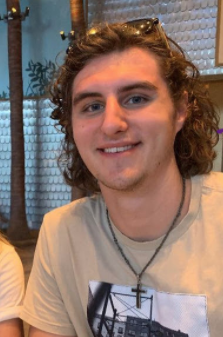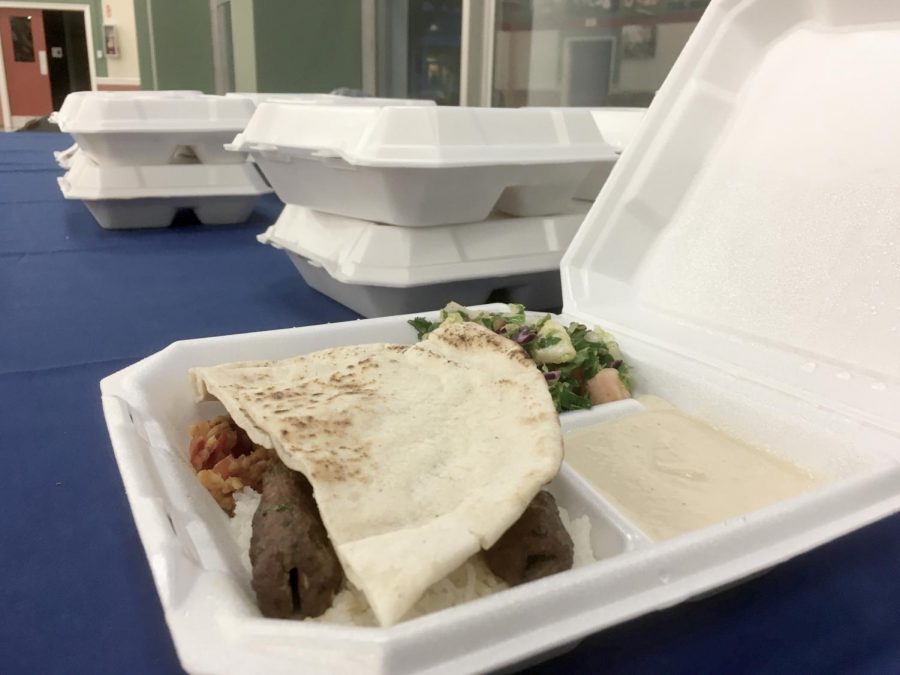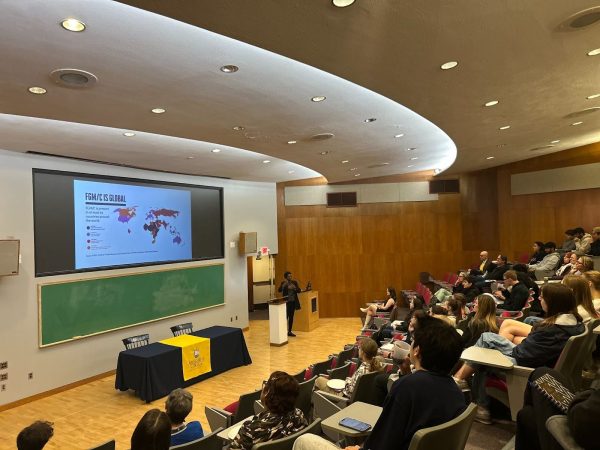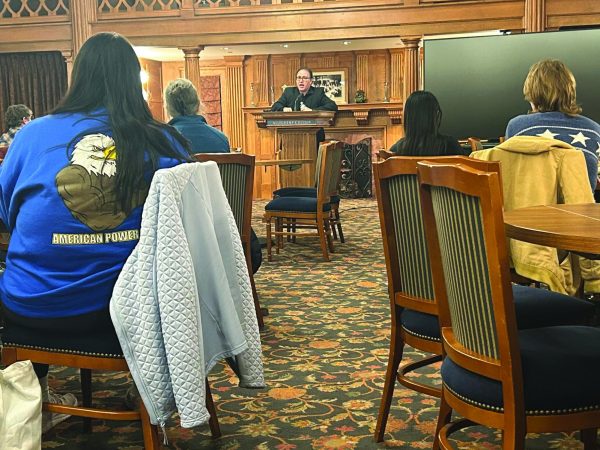Muslim community celebrates Ramadan on campus
Annual month of fasting falls during academic year for the first time in a decade
Beef kabob, rice, pita bread, salad, and hummus were served this past Wednesday for iftar, the meal to break one’s fast.
Ramadan is a time of the year in which Muslims around the world partake in a month-long, sunup to sundown fast from food and water. The final 10 days of this month have religious significance, as they observe when the Islamic scriptures were revealed to the Prophet Muhammad.
The fasting during Ramadan is one of the five pillars of the Islamic faith. In order, the pillars are: witnessing that there is no God but God himself and that the Prophet Muhammad was his final messenger, completing the five daily prayers, fasting during Ramadan, traditionally give 2.5% of your money to the Islamic state or — more modernly — give money to the poor and a one-time pilgrimage to Mecca, Saudi Arabia for those who are able.
Though upholding these five pillars and specifically fasting for a month is no easy task, the practice is very intentional.
“The idea is not that God wants to torture you,” Islamic Cultural Association advisor Dr. Sami Alkyam said. “The idea is to test your limits and see if you can control your desires because that is the difference between human beings and animals. We both have desires but ours should be controlled and theirs are not controlled because they were not given that mind to choose what is right and what’s wrong for them. The other thing is to reflect and be more appreciative of what you have because you miss it most when you do not have access to it.”
Fasting is used as a means to an end during Ramadan. There is an intentionality to not only demonstrate self-control above that of an animal, but to then grow spiritually through the experience as well.
“Ramadan’s very humbling because I feel like it teaches you a lot of lessons without saying anything,” Aden Salim, ’21, said. “For instance, you go all day without eating and then you drink a bottle of water and have a bag of chips and you’re full. It’s so easy how in the midst of suffering you can get so caught up in getting what you want that you lose sight of what’s really coming for you in your future. It’s so easy to get stuck in that vicious cycle of ‘I want this, this, and this right now’ but then when you get it you don’t feel any different.”
While fasting is the aspect most commonly associated with Ramadan, there are many others that make the month meaningful.
“Personally, I don’t listen to any music,” Salim said. “Basically the most talked about parts are no eating or drinking but you’re also supposed to refrain from cursing or aggressive language, you’re not supposed to fight, steal, cuss or masturbate. You’re just supposed to try to be the best person you can be, so it’s not just about the food. To paraphrase, in the Hadith it says if you fast but don’t change any of your ways then you’re just getting an empty stomach for nothing.”
Another way Muslims seek to better themselves is through prayer, which is another one of the five pillars of Islam and heavily emphasised during Ramadan. Although not all Muslims pray everyday throughout the year, Ramadan encourages many to renew the practice.
“I always tell my Muslim students, but this is not exclusive to Islam, that human beings need checkpoints to function and keep on track,” Alkyam said. “In Islam specifically, the five prayers are repeated and it’s the same exact prayer and the same exact time every day. No matter what you’re busy with, the moment you hear the call for the prayer it puts your mind at peace.”
Alkyam also elaborated on the meaning behind the words “Allahu Akbar” in prayer and how its meaning relates to busyness.
“It means ‘God is the greatest,’ meaning he is greater than whatever work you are busy with,” Alkyam said. “He’s greater than the family you are with. He’s greater than the food you are eating.”
This year’s Ramadan has been met with more busyness than usual. For religious purposes, Muslims follow the lunar calendar, which is based on the phases of the moon. The moon’s 12 months add up to roughly 354 days, causing Ramadan to move backward by about 11 days each year. For the first time since Dr. Alkyam was an undergraduate student, Ramadan is taking place during the academic year which has posed additional challenges.
“I’ve been fasting since I was a kid so it just kind of comes easy to me,” ICA president Iman Benharrats, ’22, said. “But this is the first year that we’ve been fasting during the academic year so for a lot of people I think it’s very new trying to balance doing our homework while fasting. It can get hard at times because your energy’s low.”
This is a reality that Islamic students will have to get used to as Ramadan will now take place during the academic year for quite some time. With Ramadan moving out of the summer there are many aspects of the month that will be missed.
“I loved when it was in the summer because I would be with my friends and we would go to the Mosque and we would pray at these late night prayers called Tahajjud,” Benharrats said. “We would go to those and it’s all night so then after we would go to eat or get ice cream before it was sunrise again.”
Alkyam recalled his memories of Ramadan in the summers which look very different now.
“I have always spent Ramadan with my family and with my mom cooking,” Alkyam said. “To make it kind of tangible for you, the way we gather for Ramadan, I’ve only ever seen Americans gather like that during Thanksgiving or Christmas. The difference in my case is for you it’s one or two days but in ours it’s really a full month.”
Despite this, Alkyam is appreciative of what Allegheny has allowed ICA to do during this time. The club meets every night to pray together and break fast with catered food in Schultz Banquet Hall.
“I’m very pleased that the college gave us the financial capabilities and gave us the space to do this,” Alkyam said. “It mimics the creation of the community that we all miss. The students have bonded more because they’ve been eating together for almost 22 days and, by the end of the month, 30 days.”
The bond between Islamic students on campus is tightening, as they share their common religious beliefs and practices with each other. However, not all students share this commonality. Alkyam, Salim and Benharrats all echoed remarks that in general they have almost always been treated with respect on and off campus as a minority religion.
“I think I’ve encountered people who have been understanding for the most part,” Benharrats said. “I think people are generally just curious, they’re not trying to be rude or anything.”
Benharrats recalled the frequent questions she has received about not being able to drink water or chew gum. Sometimes differences go beyond curiosity however, such was the case for Salim’s mother.
“I haven’t experienced overt racism personally, but I know my mom used to walk around with her hijab on in D.C. and people would aggress her, especially after 9/11,” Salim said. “All her friends and family were telling her not to wear her hijab around. Me personally, I just look like a regular old Black guy, so it’s not like people can come out at me and be like ‘I don’t like you because you’re Muslim’ because they don’t even know. But it just really goes to show that when you say that to someone because you can see it on them you look stupid because I’m that same person.”
There are many ways in which Muslim and non-Muslim relations have strengthed.
“It’s a process, not a product,” Alkyam said. “American freedom isn’t something that was found in the street and picked up. This year was better than last year and next year will be better. That train of work that has been started is what I don’t want to see stop.”

Jordan Greynolds, '22, is a features editor for The Campus newspaper and it is his second semester on staff. He is a business and religious studies double...

Sami Mirza is a senior from many different places. He is majoring in International Studies with a focus on the Middle East and North Africa and minor in...








